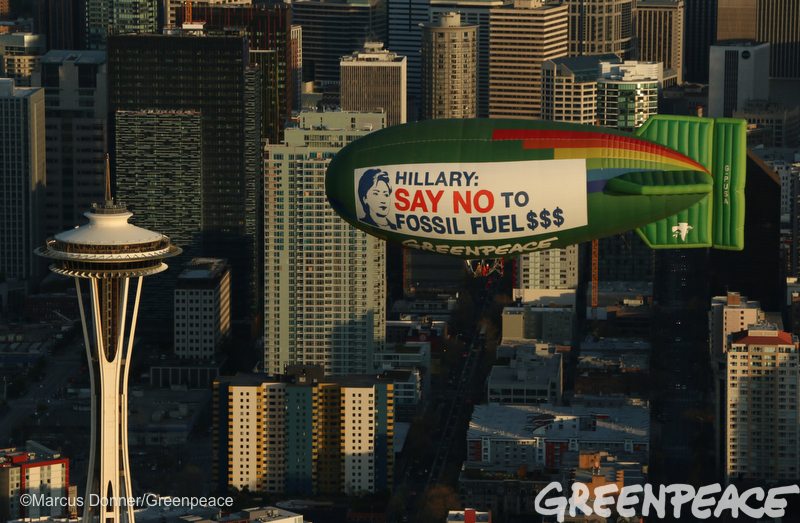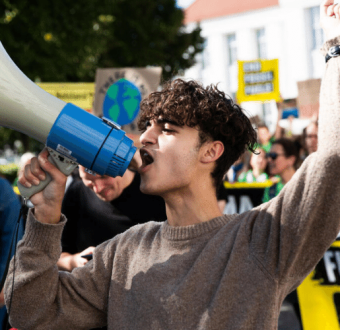Something truly amazing happened last week in our nation’s capitol. More than 300 people representing the civil rights movement, the labor movement, the environmental movement and more were arrested on the steps of Capitol Hill while calling on our nation’s leaders to fix our broken democracy.
It felt epic. It was historic. Media reported it was “the most important protest of the 2016 election.” And it was just the beginning.
Leaders in the progressive movement , including Greenpeace USA’s Executive Director Annie Leonard, stood shoulder to shoulder as part of the Democracy Awakening, a mass mobilisation intended to not only illustrate the breadth and diversity of the movement to fix democracy, but also to confront Congress with specific demands.
- Protect voter rights
- End the era of big money in politics
- Fair consideration of President Obama’s Supreme Court nominee.
NAACP President Cornell Brooks urged a crowd of thousands during Democracy Awakening to “stay woke” in the fight to build a better democracy that works for the people, represents the people, and includes the people.

Cornell Brooks, President of the NAACP, speaks at the Democracy Awakening Rally on Sunday April 17, 2016.
There is no doubt that people across the country intend to do just that.
For starters, the mass protests, including Democracy Spring, which kicked off at the beginning of April in Philadelphia, inspired more than 100 lawmakers to call for voting rights and campaign finance hearings days after the arrests on Capitol Hill. Rep. John Sarbanes (D-MD) led fellow Congressional lawmakers to send a letter to the House committees asking them to hold hearings on key pieces of legislation related to voting rights and campaign finance.
This is because of the pressure people like you put on them. Taking direct action to show Congress much we care about democracy works!
Democracy Movement Grows Across the Country
Of course, changes in our democracy can start in so many places other than on the steps of Capitol Hill.
Although easy to forget, there are political races happening other than the presidential race. And people are taking advantage of this opportunity by asking candidates in downballot races to take the pledge to “fix democracy,” vowing to reject future campaign contributions from the fossil fuel industry and protect voting rights.
Find out how people in Maryland are asking candidates to #FixDemocracy.
The Democracy Awakening mobilization is building on the grassroots movement to fix democracy that’s been growing for some time. We wrote about the inspiring victories and initiatives to protect voter rights and clean up elections from Florida to Washington at the start of 2016. We can’t wait to see what state and local democracy victories we’ll be talking about at the end of 2016.
Big Money Questions on the Campaign Trail

The Greenpeace A.E. Bates thermal airship flies over Seattle, Washington and the Space Needle on March 25, 2016 urging Hillary Clinton to reject fossil fuel money in her campaign. The Democratic caucuses are March 26, 2016. Photo by Marcus Donner/Greenpeace
While the exchange between a Greenpeace activist and Secretary Hillary Clinton made headlines when the activist asked Clinton whether she would reject money from fossil fuel executives and lobbyists, Secretary Clinton has still not taken the pledge to fix democracy. When it comes to addressing climate change, Clinton’s rhetoric on the campaign trail is getting stronger and stronger, yet it’s clear the people expect anyone with presidential aspirations to drop influential ties with the very industry causing climate change in the first place.
That requirement applies to Republicans. More than half of Senator Ted Cruz’s super PAC money comes fossil fuel interests, and he receives more than $1 million from fossil fuel executives. That number does not even extend to lobbyists. So both parties have a serious fossil fuel funding problem. Of course, none of the GOP presidential candidates acknowledges climate change as an issue, though downballot candidates who’ve taken the pledge cross party lines.
From rallies to debates to fundraisers to the occasional message from a thermal airship, people from across the country will no doubt show up any way they can to demand a presidential election free of fossil fuel money.
While the threats to our democracy are urgent and serious with far-reaching implications. The good news is that there are so many ways to start to fix democracy that everyone can play a role. We look forward to sharing more of the inspiring ways that people are building a democracy that represents the people, at the ballot box, on the campaign trail, and in elected offices.
Now that Democracy is wide awake, we’re all in for a democracy summer.



